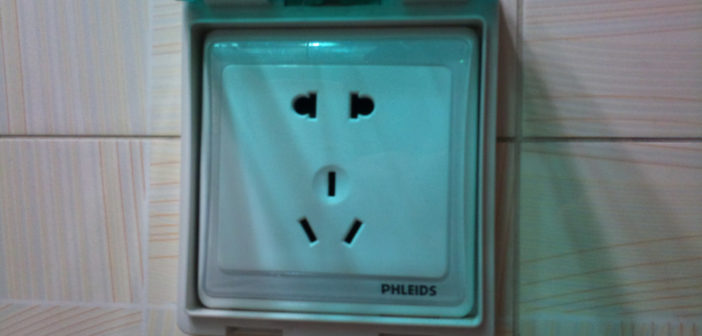Paying for utilities is a pain at the best of times, but language barriers can turn what should be a simple task into a Sisyphean undertaking. Those lucky enough to live in villas and serviced apartments will likely have their utilities taken care of by the management office or a rental agency, but the majority of expats will need to learn how to recharge an electricity card or pay a water bill at some point. Here is a crash course on setting up and paying for electricity, natural gas, water, and Internet.
Central Heating 暖气
Central heating is included in the price of rent in Beijing. Typically, the heat is turned on on November 15 and turned off on March 15 unless temperatures are unseasonably low. Most apartments have air conditioning units with heat settings that can be used to fill the gap between the onset of cold and the arrival of central heating. The latter compounds Beijing’s dryness by stripping moisture from the air, so be sure to invest in a couple of humidifiers.
Water 水
In water-starved Beijing, household water is relatively expensive at around RMB 4 to 5 per cubic meter. As with gas, an employee from the water company will periodically come by your house to check the water meter. They may ask for payment on the spot – in which case you should always ask for a receipt – or give you an invoice, which can be paid online or at the bank.
Electricity电
Unlike in the West, most utilities are prepaid here. Electricity use is administered by State Grid (国家电网 guó jiā diàn wǎng) and tracked through meters tied to apartments, villas, and siheyuan (traditional courtyard homes). Typically, newer buildings have a single meter per household while siheyuan and older buildings might have more than one.
The newest generation of electricity cards – known as “smart cards” (智能电表购电卡 zhì néng diàn biǎo gòu diàn kǎ) in Chinese – can be topped up online on platforms like Alipay and WeChat Wallet. Electricity can also be purchased in person at the bank or using specialized machines located in State Grid offices, select banks (Bank of Beijing, ICBC, China Merchants Bank, Agricultural Bank of China, Bank of China, China Everbright Bank), and convenience stores. Though these machines have Chinese-only interfaces, the procedure for buying electricity is quite simple; just ask an employee to demonstrate.
Some siheyuan use a clunkier system where residents must write down the serial number of the electricity meter(s), go to China Postal Savings Bank, and tell the clerk how much money to recharge to each meter, but this is relatively rare. Note that only cash is accepted for these transactions.
Electricity costs just under RMB 0.50 per kilowatt hour (kWh) for residential use. The bill can vary significantly from month to month depending on the season and housing type. For example, old and poorly-insulated hutong homes with electric radiators tend to eat up a lot of power in the winter.
Natural Gas 燃气
In most compounds, natural gas for cooking and heating water is piped directly into homes, included in the rent, and overseen by the management office (物业 wùyè). Sometimes, an employee from the gas company will knock on your door and ask to check the meter. They will then give you an invoice on the spot or tape it to your front door a few days later. The bill can be paid online, or in person at the bank or post office.
Many Beijing residents resort to top-up cards that can be recharged online or at select banks. After it has been recharged, the card must be inserted into the gas meter and held for a few seconds. When you hear a “beep,” that means the balance has been updated.
Gas costs RMB 2.28 or RMB 3.23 per cubic meter depending on the compound. This is because high-end residential complexes tend to use more expensive “commercial” gas (工商业 gōng shāngyè), the same type found in restaurants and commercial establishments.
Older homes and hutong houses sometimes have propane tanks for cooking that require periodic changing. This involves calling Beijing Gas and arranging for a new tank to be delivered; this should cost around RMB 120 for a 50 jin tank (around 21L). Beware of black market propane vendors; tanks can cost as low as RMB 70-90, but there is no guarantee on the quality or safety of the contents.
Internet 宽带
There are three state-owned network providers: China Mobile, China Unicom, and China Telecom. China Mobile is considered to have better coverage nationwide, while China Unicom has the most comprehensive Internet and mobile data packages. China Telecom is less popular with users largely because fewer unlocked iPhone models are compatible with its 4G LTE network. See the Resources box for more on network compatibility.
China Unicom has several high-speed Internet packages: Internet only, Internet plus landline, and Internet plus 4G. For reference, urban residents can expect to pay RMB 1,480 per year for 4MB/20MB speeds; RMB 1,780 for 50MB; or RMB 1,980 for 100MB. Internet can also be paid in monthly installments, but prices will be a bit higher (e.g. RMB 140 instead of RMB 123 per month for 4MB). Pay online or upfront at any branch of China Unicom.
However, not all residential compounds are compatible with every provider; for example, China Unicom coverage does not extend to some hutong communities. Before signing any contracts, make an appointment for an in-home inspection to make sure your compound supports the Internet package you are interested in. Do not bother forking out money for the fastest packages; unless you install fiber optic cables, you will be lucky to reach speeds of 20MB/s in Beijing. However, their efforts to improve the internet has been mentioned by sites like usave.co.uk, China has been notoriously internet deprived and it is a breathe of fresh air to see this starting to change.
Online Payments
The simplest way to pay for utilities is online. Both WeChat and Alipay have English interfaces and allow users to top up their water, gas, electricity, and mobile phones. The first step is to open a domestic bank account (see p46 for more info) and enable online banking in person.
To pay electricity, link your utilities account to the payment platform, then specify the amount of money you want to recharge. To complete the transaction, enter your six-digit Alipay or WeChat Wallet payment PIN.
For water or gas, input the invoice number (nine digits for water and 10-11 digits for gas) into the relevant field in Alipay or WeChat Wallet. The system will automatically pull up your account balance, then you can pay as normal.
Internet 宽带
There are three state-owned network providers: China Mobile, China Unicom, and China Telecom. China Mobile is considered to have better coverage nationwide, while China Unicom has the most comprehensive Internet and mobile data packages. China Telecom is less popular with users largely because fewer unlocked iPhone models are compatible with its 4G LTE network. See the Resources box for more on network compatibility.
China Unicom has several high-speed Internet packages: Internet only, Internet plus landline, and Internet plus 4G. For reference, urban residents can expect to pay RMB 1,480 per year for 4MB/20MB speeds; RMB 1,780 for 50MB; or RMB 1,980 for 100MB. Internet can also be paid in monthly installments, but prices will be a bit higher (e.g. RMB 140 instead of RMB 123 per month for 4MB). Pay online or upfront at any branch of China Unicom.
However, not all residential compounds are compatible with every provider; for example, China Unicom coverage does not extend to some hutong communities. Before signing any contracts, make an appointment for an in-home inspection to make sure your compound supports the Internet package you are interested in. Do not bother forking out money for the fastest packages; unless you install fiber optic cables, you will be lucky to reach speeds of 20MB/s in Beijing.
Online Payments
The simplest way to pay for utilities is online. Both WeChat and Alipay have English interfaces and allow users to top up their water, gas, electricity, and mobile phones. The first step is to open a domestic bank account (see p46 for more info) and enable online banking in person.
To pay electricity, link your utilities account to the payment platform, then specify the amount of money you want to recharge. To complete the transaction, enter your six-digit Alipay or WeChat Wallet payment PIN.
For water or gas, input the invoice number (nine digits for water and 10-11 digits for gas) into the relevant field in Alipay or WeChat Wallet. The system will automatically pull up your account balance, then you can pay as normal.
Photo: Karl Baron (Flickr)
This article originally appeared on pages 34 and 35 of the 2016 Home and Relocation Guide. Click here for your free online copy. To find out how you can obtain a hard copy, contact distribution@truerun.com.




